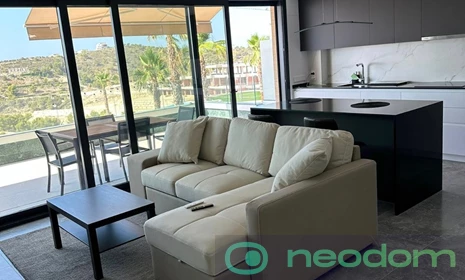
How to choose the perfect accommodation on the coast of Spain?
Choosing a home on the coast of Spain is not only an opportunity to find your own corner in one of the most desirable regions of Europe, but also an investment in your own source of energy and health. Living by the sea has a lot of advantages, ranging from a mild climate to opportunities for recreation and entertainment. The sound of the waves, the fresh sea breeze, the abundance of sunny days and the availability of the freshest seafood - all this significantly improves the quality of life and contributes to excellent well-being.
However, you should choose housing on the coast carefully, taking into account a number of basic criteria that will help you find your ideal house or apartment. Among them:
Location: choice between the north and south coasts, proximity to beaches and infrastructure.
Type of accommodation: determining whether you need a cozy apartment, a spacious villa, or a home in a secluded location.
Infrastructure: accessibility to shops, restaurants, medical facilities and transport hubs.
Security: assessment of the level of the criminal situation and the availability of security.
Legal purity of the transaction: checking the legal aspects of the purchase, including the availability of all necessary licenses and permits.
When choosing, you also need to consider personal preferences and lifestyle. Lovers of outdoor activities should pay attention to the proximity of sports facilities and places for water sports. For families with children, it is important to have schools, playgrounds and safe beaches. When looking at the long term, don't forget to assess the potential for growth in the value of the property and its liquidity in the market, which can go a long way towards reselling or renting it out.
Spain offers a wide range of beachfront properties to suit all tastes and budgets. From lush villas overlooking the sea to compact apartments in resort towns, everyone can find a place here that will become their second home or a profitable investment asset. The main thing is to carefully approach the choice and take into account all the important factors so that living on the Spanish coast is not only comfortable, but also safe.
Types of housing on the coast of Spain
Villas and houses on the coast of Spain are a symbol of luxury and privacy. This option is suitable for those who want to enjoy peace and tranquility away from noisy resorts. Villas often feature spacious plots with gardens and private pools, giving owners the opportunity to enjoy the Mediterranean climate to the fullest. When choosing a villa or a private house, it is important to take into account the distance to the nearest cities, the availability of services and infrastructure. It is also worth paying attention to the possible maintenance costs of the facility, which can be a significant factor in making a decision.
Apartments and flats are ideal for active travelers and investors, while villas and houses will offer exclusivity and privacy for those seeking comfort and privacy. In any case, housing on the coast of Spain promises to be a magnificent refuge under the warm Mediterranean sun, providing priceless moments of relaxation and enjoying life to the fullest.
Location & Infrastructure Definition

When choosing the ideal home on the coast of Spain, one of the important aspects is to determine the location and infrastructure. This criterion has a significant impact on the convenience and quality of life, as well as the potential investment attractiveness of the property.
Popular regions and their characteristics: For example, the Costa Brava attracts lovers of picturesque landscapes and privacy, while the Costa del Sol is ideal for those who prefer an active social life and a high level of services. The Costa Blanca, on the other hand, is famous for its sandy beaches and developed infrastructure, making it a great choice for families and retirees. Paying close attention to details such as climate, building density, proximity to airports, and natural attractions will help you identify the region that best suits your preferences.
The importance of accessibility of amenities and services: The Spanish coast offers a wide range of properties, but it is equally important to consider proximity to key amenities and services. The presence of shops, restaurants, medical facilities and schools within walking distance significantly increases the attractiveness of housing. In addition, for a good rest and life, it is important to have entertainment and sports facilities, such as:
- Beaches with the possibility of water sports;
- Golf clubs;
- Yacht clubs and marinas;
- Spa and fitness centers;
- Cultural and historical attractions.
Taking into account these factors, you will be able to choose housing in Spain, which will not only be a beautiful and comfortable place to live, but also a profitable investment. Do not forget about the possibility of renting your home during periods of absence, which can become an additional source of income and compensate for part of the cost of its maintenance.
Legal Aspects of Buying a Home
Buying a home on the coast of Spain is not only an opportunity to enjoy a warm climate and picturesque landscapes, but also an important legal process that requires attentiveness and knowledge. First of all, it is necessary to familiarize yourself with the list of documents and permits provided by Spanish law for the purchase and sale of real estate. Key documents include a title deed (Escritura de Propiedad), which confirms the seller's ownership, as well as a certificate from the Registrar of Companies (Nota Simple) indicating that there are no encumbrances or debts on the property. A purchase permit for foreign nationals (Número de Identificación de Extranjero - NIE) and proof of the buyer's financial solidity will also be required.
For a safe purchase of real estate on the Spanish coast, you should adhere to a few tips. Firstly, it is important to conduct a thorough check of the legal purity of the property, which includes studying the history of the property and checking the presence of debts for taxes and utility bills. Secondly, it is recommended to use the services of a professional agency or lawyer specializing in the Spanish real estate market, which will help you avoid potential risks. Do not forget about the notarization of the transaction, which is a mandatory stage that guarantees the legality of the purchase process.
Financial Aspects of Choosing a Place to Live
Choosing housing on the coast is not only a matter of comfort and beauty of the surrounding nature, but also a serious financial investment that requires competent planning. The first and most important aspect is your budget and the hidden costs that may arise during the buying process. It is important to think in advance about how much you can afford to invest, taking into account not only the cost of housing in Spain, but also additional costs: agency commissions, property registration fees, notary costs, and possible repairs. In addition, it is worth estimating the annual costs of taxes, insurance, and housing maintenance. But do not forget that you can rent a house in Spain for a long time if you do not have enough money to buy.
The second financial aspect that needs to be considered is the possibility of mortgage lending. A mortgage can be a convenient solution for those who are not ready to pay the entire amount at once. Spanish banks offer mortgage loans for non-residents, but the conditions can differ significantly from those for residents of the country. You'll need to be well aware of the following parameters:
- Interest rates and bank commissions;
- Down payment requirements (as a rule, it is higher for non-residents);
- Loan term and the possibility of early repayment without penalties.
A house in Spain also entails certain tax liabilities. It is important to consider the property tax (IBI), which varies depending on the municipality, as well as the income tax for those who rent out their homes. In addition, there is a property transfer tax (ITP) for resale properties and VAT on the purchase of a new building. Proper understanding and accounting of taxes will help to avoid unexpected expenses in the future.
Practical tips and tricks
Choosing a home on the coast of Spain is a dream of many, but before the wonderful sea views become part of everyday life, a thorough inspection of the chosen property is necessary. The inspection of the home should be comprehensive and include not only an assessment of the condition of the exterior façade and interior, but also a check of the water supply, electricity, heating and air conditioning system. It is equally important to make sure that there is no moisture and mold, which can be common problems in coastal areas. It is also worth paying attention to sound insulation, especially if the chosen property is located in a popular tourist area.

Buying a property is a significant investment, and it is important not to limit this process to a personal inspection. The importance of professional advice cannot be overstated. Contacting qualified real estate agents, lawyers and independent appraisers will help not only in assessing the real value of the property, but also in identifying possible hidden defects and legal issues. Experts can provide up-to-date information on the market situation, recommendations on the best areas to buy, and advice on how to complete the transaction, taking into account all regulatory requirements.
By following these practical tips and tricks, future homeowners on the Spanish coast can significantly reduce risks and invest in their dreams with confidence. Viewing the property and professional advice are the key steps on the way to choosing the perfect home by the sea, where every day will be filled with the sun, the sound of the waves and the carefree Spanish mood. Our houses by the sea!
- Mortgage in Spain 2024
- Apartment design in Spain: trends and features
- How to buy a second property in Spain?
- How to Sell an Apartment in Spain: Prices, Benefits and Legal Aspects
- How to choose the perfect accommodation on the coast of Spain?
- Is it possible to buy a castle or mansion in Spain?

